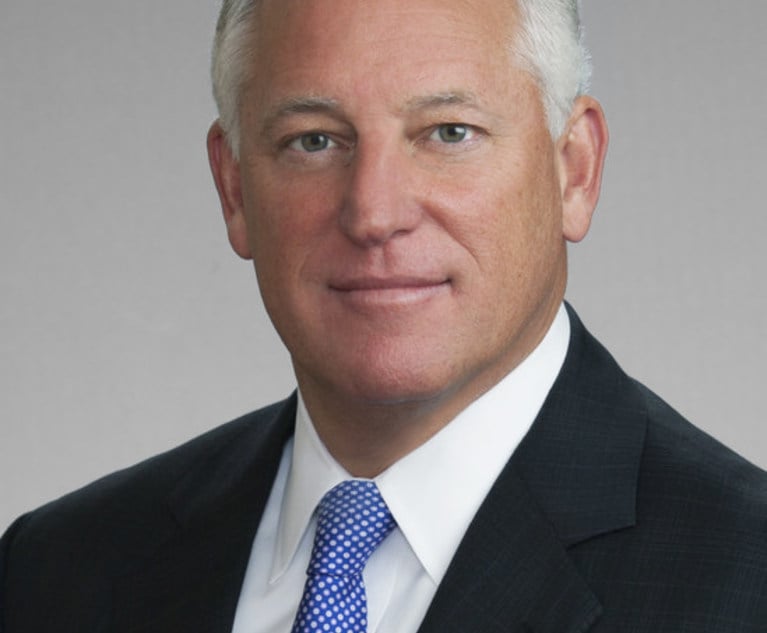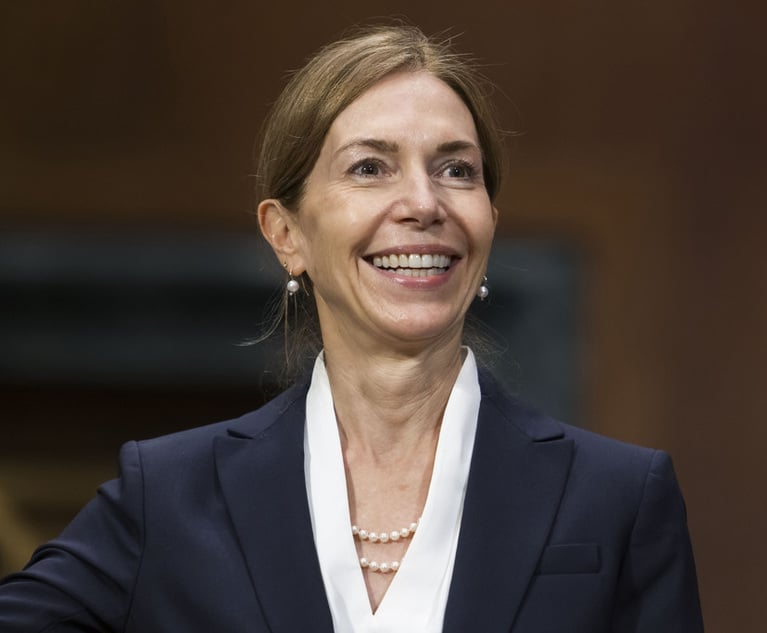 Elizabeth Holmes and attorneys from Williams & Connley head into the Northern District on Monday, January 13. (Photo: Jason Doiy/ALM)
Elizabeth Holmes and attorneys from Williams & Connley head into the Northern District on Monday, January 13. (Photo: Jason Doiy/ALM)Elizabeth Holmes' Lawyer Assails Theranos Prosecution as 'Massive Case With Undefined Contours'
Williams & Connolly's Amy Saharia said prosecutors had used "fudging language" in the indictment of the former Theranos chief to keep the charges as "broad as they can possibly be so they can shift their theory as they go along."
February 10, 2020 at 05:25 PM
4 minute read
The original version of this story was published on The Recorder
SAN JOSE — The federal judge overseeing the criminal wire fraud case against Theranos founder Elizabeth Holmes and the company's former COO and president Ramesh Balwani didn't tip his hand during defense lawyers' arguments Monday seeking to knock out criminal charges.
Federal prosecutors have claimed the pair misled investors and patients, and that Holmes and Balwani knew Theranos' blood analyzer could not deliver on the public promises they were making to provide "fast, inexpensive, accurate, and reliable" tests.
But at a hearing Monday, U.S. District Judge Edward Davila did indicate he is skeptical of the government's contention that the alleged scheme's victims include doctors and patients whose blood testing services were paid for by insurance.
"I look at this and, candidly, I think they don't appear to be victims," said Davila toward the end of two-plus hours of arguments on defense motions to dismiss the case. Davila, however, stopped short of ruling, and said that, for now, the case will move forward on its current schedule, with a trial set to begin in August.
Holmes and Balwani were initially indicted in July 2018 on two counts of conspiracy to commit wire fraud and nine counts of wire fraud based on claims they knew Theranos' blood analyzer could not deliver on their promises to investors and patients.
Holmes' lawyers at Williams & Connolly asked Davila to knock out the indictment or, alternatively, prod the government for more specifics on its theory and proof in three separate motions filed in December, which were joined by Balwani's lawyers at Orrick, Herrington & Sutcliffe.
Williams & Connolly's Amy Saharia, who handled the lion's share of defense arguments Monday, called the prosecution a "massive case with undefined contours." The government, she said, has handed over 2 million documents in discovery and identified more than 300 articles about the company and 35 recorded presentations by Holmes during the relevant period, but has so far declined to identify any single statement it alleges was false or misleading. She said government prosecutors used "fudging language" in the indictment to keep the charges as "broad as they can possibly be so they can shift their theory as they go along." In particular, she said that prosecutors charged Holmes with knowing that her tests didn't "consistently" provide reliable results without providing a definition of what "consistently" means.
Orrick's Stephen Cazares also argued that the charges lacked the specificity necessary for his client to prepare a defense. "We need some definition and to the extent that the government doesn't want to define 'accuracy' and 'reliability'" that's problematic, he said.
Arguing for the government, Assistant U.S. Attorney John Bostic cautioned the judge that the defense lawyer wouldn't be happy with any version of the indictment since it was charging their clients with a scheme to mislead investors and patients about the viability of the company and its tests. He also argued the government doesn't have an obligation to detail the evidence it will introduce at trial in the indictment, and must only provide the defendants with notice of the crimes they are accused of committing to avoid possible double jeopardy.
"They encouraged patients and doctors to use these tests to make clinical decisions," Bostic said. "This was about giving patients valuable medical information that they could use and that their doctors could use to make decisions about health care."
Read more:
This content has been archived. It is available through our partners, LexisNexis® and Bloomberg Law.
To view this content, please continue to their sites.
Not a Lexis Subscriber?
Subscribe Now
Not a Bloomberg Law Subscriber?
Subscribe Now
NOT FOR REPRINT
© 2024 ALM Global, LLC, All Rights Reserved. Request academic re-use from www.copyright.com. All other uses, submit a request to [email protected]. For more information visit Asset & Logo Licensing.
You Might Like
View All
Phila. Med Mal Lawyers In for Busy Year as Court Adjusts for Filing Boom
3 minute read
In Talc Bankruptcy, Andy Birchfield Skipped His Deposition. Could He Face Sanctions?
6 minute read
Health Care Giants Sue FTC, Allege Lina Khan Using Loaded Process to Vilify Pharmacy Benefit Managers
3 minute readLaw Firms Mentioned
Trending Stories
- 1Gibson Dunn Sued By Crypto Client After Lateral Hire Causes Conflict of Interest
- 2Trump's Solicitor General Expected to 'Flip' Prelogar's Positions at Supreme Court
- 3Pharmacy Lawyers See Promise in NY Regulator's Curbs on PBM Industry
- 4Outgoing USPTO Director Kathi Vidal: ‘We All Want the Country to Be in a Better Place’
- 5Supreme Court Will Review Constitutionality Of FCC's Universal Service Fund
Who Got The Work
Michael G. Bongiorno, Andrew Scott Dulberg and Elizabeth E. Driscoll from Wilmer Cutler Pickering Hale and Dorr have stepped in to represent Symbotic Inc., an A.I.-enabled technology platform that focuses on increasing supply chain efficiency, and other defendants in a pending shareholder derivative lawsuit. The case, filed Oct. 2 in Massachusetts District Court by the Brown Law Firm on behalf of Stephen Austen, accuses certain officers and directors of misleading investors in regard to Symbotic's potential for margin growth by failing to disclose that the company was not equipped to timely deploy its systems or manage expenses through project delays. The case, assigned to U.S. District Judge Nathaniel M. Gorton, is 1:24-cv-12522, Austen v. Cohen et al.
Who Got The Work
Edmund Polubinski and Marie Killmond of Davis Polk & Wardwell have entered appearances for data platform software development company MongoDB and other defendants in a pending shareholder derivative lawsuit. The action, filed Oct. 7 in New York Southern District Court by the Brown Law Firm, accuses the company's directors and/or officers of falsely expressing confidence in the company’s restructuring of its sales incentive plan and downplaying the severity of decreases in its upfront commitments. The case is 1:24-cv-07594, Roy v. Ittycheria et al.
Who Got The Work
Amy O. Bruchs and Kurt F. Ellison of Michael Best & Friedrich have entered appearances for Epic Systems Corp. in a pending employment discrimination lawsuit. The suit was filed Sept. 7 in Wisconsin Western District Court by Levine Eisberner LLC and Siri & Glimstad on behalf of a project manager who claims that he was wrongfully terminated after applying for a religious exemption to the defendant's COVID-19 vaccine mandate. The case, assigned to U.S. Magistrate Judge Anita Marie Boor, is 3:24-cv-00630, Secker, Nathan v. Epic Systems Corporation.
Who Got The Work
David X. Sullivan, Thomas J. Finn and Gregory A. Hall from McCarter & English have entered appearances for Sunrun Installation Services in a pending civil rights lawsuit. The complaint was filed Sept. 4 in Connecticut District Court by attorney Robert M. Berke on behalf of former employee George Edward Steins, who was arrested and charged with employing an unregistered home improvement salesperson. The complaint alleges that had Sunrun informed the Connecticut Department of Consumer Protection that the plaintiff's employment had ended in 2017 and that he no longer held Sunrun's home improvement contractor license, he would not have been hit with charges, which were dismissed in May 2024. The case, assigned to U.S. District Judge Jeffrey A. Meyer, is 3:24-cv-01423, Steins v. Sunrun, Inc. et al.
Who Got The Work
Greenberg Traurig shareholder Joshua L. Raskin has entered an appearance for boohoo.com UK Ltd. in a pending patent infringement lawsuit. The suit, filed Sept. 3 in Texas Eastern District Court by Rozier Hardt McDonough on behalf of Alto Dynamics, asserts five patents related to an online shopping platform. The case, assigned to U.S. District Judge Rodney Gilstrap, is 2:24-cv-00719, Alto Dynamics, LLC v. boohoo.com UK Limited.
Featured Firms
Law Offices of Gary Martin Hays & Associates, P.C.
(470) 294-1674
Law Offices of Mark E. Salomone
(857) 444-6468
Smith & Hassler
(713) 739-1250









